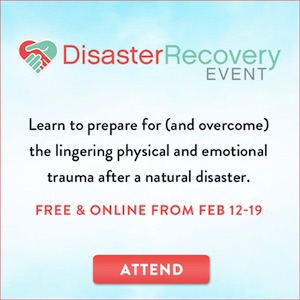
My friend and colleague Dr. Shiroko Sokitch, and the crew at HealthMeans have created the Disaster Recovery Charity Event to help you learn to prepare for (and overcome) any lingering physical and emotional trauma after a natural disaster – fires, hurricanes, floods, mudslides, earthquakes and more.
When you register, you KEEP all the expert talks associated with the event (i.e. there is no charge), to listen and learn from at your own pace, in recovery or preparation for a natural disaster – it’s our goodwill gift to you!
In addition, a handful of global and local charities have been selected so have a choice to give back and donate to them if this feels like a good fit for you.
In my interview we talk about B vitamins for foundational nutritional support and to help with adrenal support. Research shows that a good B complex is very beneficial for disaster recovery
The use of nutrient formulas with multiple minerals and/or vitamins to minimise stress associated with natural disasters is now supported by three studies.
Of course, I also share how to use the amino acids, GABA and tryptophan, as needed when anxiety levels are high, and worry and fear are impacting your sleep.
- Serotonin support with Lidtke tryptophan or Lidtke Tryptophan Complete or Lidtke Combat Stress (a tryptophan product formulated for stress support) – especially if you’re feeling sad, worried, resolving to try and feel positive, imagining the worst, feeling fearful and having problem sleeping. You can read more about tryptophan here.
- GABA support for physical tension and an increased need to self-medicate with alcohol in order to stay calm. You can read more about GABA here.
- Children who are fearful after a disaster and have a hard time sleep, often do very well with chewable tryptophan.
I also discuss pyroluria because stress makes symptoms worse so taking additional zinc and vitamin B6 is often needed in times of added stress such as being on call to evacuate, having to evacuate and/or rebuilding after a disaster:
Pyroluria is a genetic condition that is frequently associated with a type of anxiety characterized by social anxiety, avoidance of crowds, a feeling of inner tension, and bouts of depression. People with this problem experience varying degrees of anxiety or fear, often starting in childhood, but they usually manage to cover it up and push through. They tend to build their life around one person, become more of a loner over time, have difficulty handling stress or change, and have heightened anxiety symptoms when under more stress.
Addressing low levels of the mineral zinc and vitamin B6, together with some other nutrients and stress management, are key to addressing these symptoms.
I was thrilled to be able to contribute and share my expertise. I had friends impacted by the Houston hurricane and floods, and was actively involved in online support of volunteer rescue teams. So much of the stress and nutritional advice shared in my interview and by other experts can be used for rescuers, first responders and firefighters too – many of whom are under huge amounts of stress, are also suffering from lack of sleep and may be exposed to dirty flood water, mold, smoke, and flame retardants too.
Registration details for Disaster Recovery Charity Event here. It airs online from Feb 12-19, 2018.
My heart goes out to you and your families if you have been impacted by a disaster such a flood or fire or hurricane.
And even if you have not been impacted by a disaster, tune in so you can be prepared should this happen one day in the future.
Also, keep in mind, so much of this information helps recovery from PTSD and trauma that have other non-disaster causes.
Enjoy our gift to you and please share with loved ones and friends.
Feel free to share tips that have helped you recover from a disaster so we can all help more people.

My daughter, age 23, social anxiety, took the liquid zinc sulfate test by premier research. She scored between a 1 and 2. Slightly sweet after 15 seconds.
The Recommended daily allowance of zinc is 9-11 mg a day for adults.
I’ve read that 30 plus mg of zinc can cause problems w toxicity levels.
Can you expound on why you recommend 30 mg? Is this only for people who are testing deficient?
if she continues to take the liquid at 10 mg will it not increase her levels enough for any real benefit?
If she did take 30 mg of the liquid over time, won’t she soon taste the metallic or nasty taste and know it is then time to stop or decrease to 10 again to possibly maintain?
Why can’t she continue to take liquid zinc sulfate Heptahydrate (on bottle one tsp equal 10 mg.) I know you recommend optizinc 30 mg but can you say why?
And if I switch to optizinc, at what point do we test her levels again? 2 weeks, month?
Thank you! Really want her to be able to benefit but not over do!
Cindy
Some people choose to continue using the liquid zinc – it’s simply a more expensive option. I have clients retest each week.